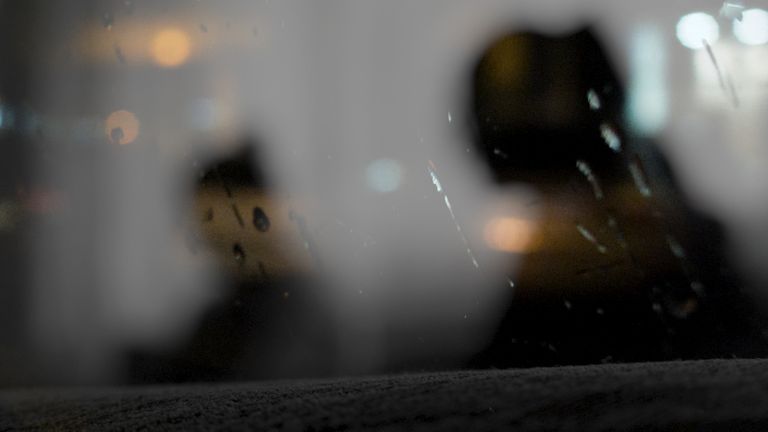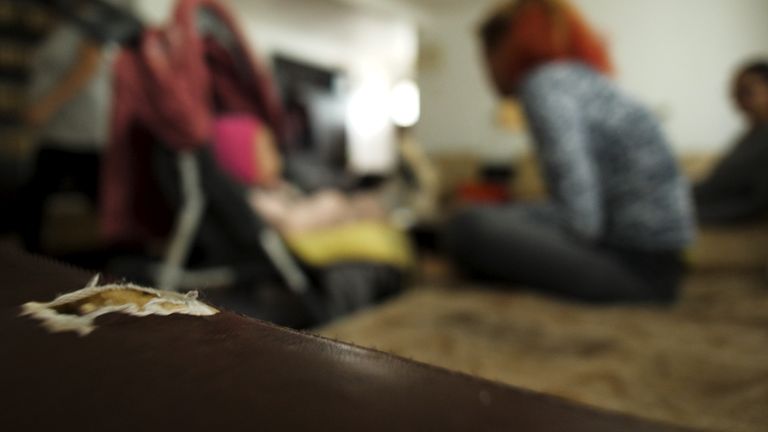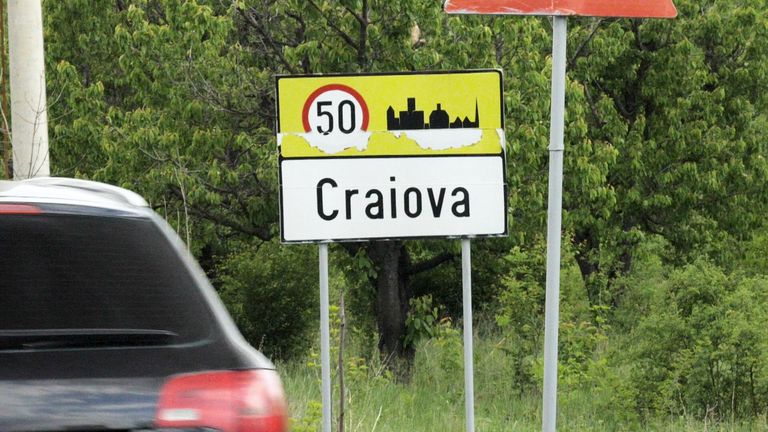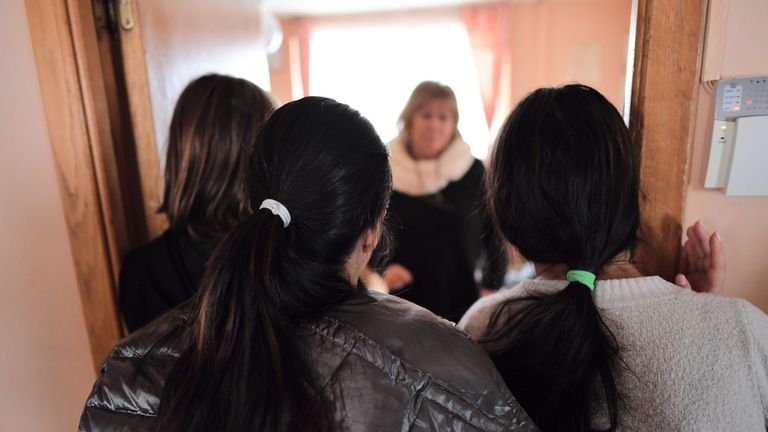Sky’s Europe Correspondent Mark Stone travelled to Romania where he found that trafficking victims are getting younger and are reliant on volunteers – not the government – for help.
Up a bumpy drive, behind a locked gate and an intercom, the rehab centre we’re here to visit is not quite what you’d expect.
The building is simple at first glance; rundown even. But this centre for trafficked women is a sanctuary for those who end up here and the woman who runs it, modest and unassuming, is their saviour.
Iana Matei greets us at the door. It’s clear immediately that she has a warm character; she seems kind but determined and no-nonsense.
We are in Romania, a country sadly synonymous with trafficking. Iana had warned me that the women we would meet are young but I wasn’t prepared for how young.
“Many of these girls started their sexual life at nine, 10, 11 years old,” Iana tells me as we sit in her office. “These are children who have never been loved.”
The giggling from next door demonstrates that those in her care are both young and happy.
The victims in Romania are getting younger, and they rely on the kindness of a few – if they are lucky.
According to the latest global figures – from 2017 – 51% of people trafficked worldwide are children, 76% are female and 69% of victims are trafficked for sex. Romania has the highest number of victims in Europe.
Tuesday 30 July is the UN’s World Day against Trafficking in Persons, an annual event since 2013, designed to raise awareness of the situation of victims of human trafficking and for the promotion and protection of their rights.
Iana, a psychologist by training, has 12 young girls here at the moment; all victims she’s rescued off the streets.
“They are very young and they end up in a very abusive situation and then when they get the courage and seek help they are again blamed by the society; somehow it’s their fault or they knew what they were getting themselves into. It’s not like that at all. These girls are survivors and in my opinion they are the heroes,” she tells me.
One of the central challenges of telling the young people’s stories is that we are not allowed, by law, to identify them.
With our cameras, we can film around them but we can’t show their faces.
The first thing to do is to reassure them about who we are and what we are doing. With Iana’s help for translation, I introduce myself and my two colleagues Sophia and Guy. The young girls seem relaxed.
After a chat with the group, Iana and I move back to her office where she takes me through the background of each victim in her care.
“So the youngest one in the programme is 14 years old and she is pregnant now. The latest girl arriving in the house is 16 years old and she already has a baby; nine months old.”
The pregnancy and the baby are the consequence of the life they were rescued from.
“They all measure very high on the empathy scale,” Iana says. “In 20 years, I never saw one girl with a low empathy score. All these girls score high on the empathy level.”
“What does that tell you?” I ask.
“That they suffer, they’ve been through so much that they immediately empathise.”
I ask Iana about the funding; how much is coming from the government? “Well from the government, nothing. Zero,” she says.
“It’s a painful subject. Can we skip it? I’m happy to say for the past four years we were sponsored by the Velux Foundation (the Danish window company who have a philanthropist arm). They were there behind us and they supported us because I am not a businesswoman. So that was the last four years. For next year if you ask me where the money’s coming from I don’t know.”
The following day, we head south on a drive. Iana wants to show me where the girls come from.
We approach Craiova, a town in southern Romania not far from the borders with Serbia and Bulgaria.
On the side of the main road in, a few miles outside the town, we pass those still in the industry.
They look older than they really are because they are heavily made up.
“Look at the girls carefully and at the end of the road you tell me how many of them were minors, if you can pick up the age,” Iana says.
“You see an increase in the number because these girls don’t cross the border yet. They are trained, groomed, whatever, here in the flats when they are very young and then as soon as they turn 13 maybe 14 you can put a lot of make-up on, take them on the street and when they turn 18 you export them, in England, in Germany, wherever you want,” she says.
Craiova is one of a number of Romanian towns known to have a particular problem with trafficking. Joint operations with other police forces including the UK are common.
But prosecutions often fail, with local corruption blamed.
In February, a case involving 26 alleged Romanian traffickers caught in a joint UK/Romanian operation collapsed amid rumours of corrupt investigators, payoffs and intimidation of witnesses.
Iana explains that the region’s recent history of war combined highest poverty levels in Europe have fuelled the trade. Weapons smugglers have broadened their business because there is more money in people than guns.
“You can sell the gun once. But you can sell the girl two times, three times. And the price increases because you have trained her. And this is how it started,” she says.
As we leave the town we pass plenty of foreign-registered cars, including many from the UK, parked outside large houses.
These ostentatious new-builds look incongruous in the rundown suburbs. Iana says some are the product of trafficking – weapons, drugs and people.
I ask Iana if she has seen any improvements over the past 20 years.
“Yes definitely you see improvement on one side and then… it’s like constantly trying to put out a fire.”
“Trafficking is a very dynamic phenomenon, traffickers change their modus operandi and you work all this time for nothing because the whole thing changed,” she explains.
“The traffickers are very mobile and connected and they network and they speak the same language but we are stuck in a heavy system that requires too many steps, too many organisations and too many approvals.”
She sighs.
“To summarise, there is some improvement in that you probably see less girls overseas at the moment. But a dramatic decrease in the age of the girls – you have 10 or 11 year old girls exploited in sex trafficking.”
Digging in the mud on the edge of Craiova I spot three young children. All around is the poverty ripe for an industry that feeds off it: vulnerable children, desperate families and ruthless traffickers.
“Where is the society?” Iana asks.
“You grow up in a society where there are some norms, you know what is not good, what is good. In today’s Europe there are parents who sell their children because the society is numb.”







